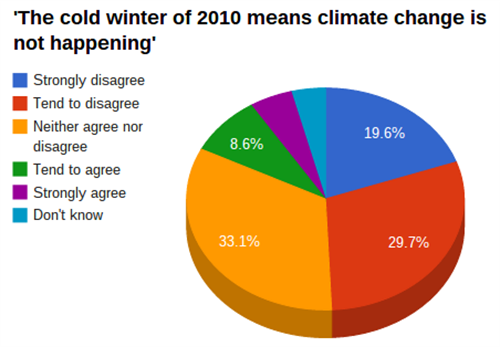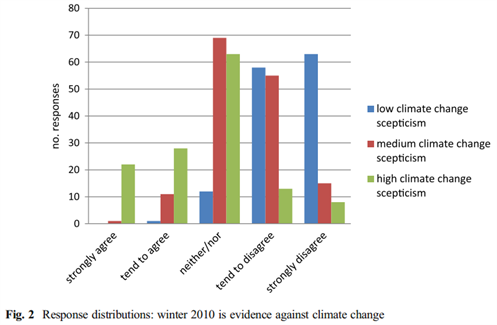Carbon Brief Staff
09.01.2014 | 2:04pmMany people in North America will today look out their windows and see snow – lots and lots of snow. The plunging temperatures have led some, like climate sceptic business tycoon Donald Trump and handful of Republican politicians, to question whether or not “global warming” is real.
Such showboating is nothing new. But is the public’s view of climate change swayed by what the weather is doing? New research looking at responses to an exceptionally cold winter in the UK suggests maybe not.
The new paper in the journal Climatic Change suggests that after a particularly cold snap, three times as many people – in the UK, at least – see the cold weather as pointing towards the reality of climate change, rather than a reason to doubt it.
People understand it gets cold sometimes
A number of studies have suggested there’s a link between peoples’ belief in climate change and their own experiences of local temperatures.
The theory goes that when working out whether or not climate change is a real phenomenon, people tend to trust “the evidence of their own eyes” above scientific research.
Researchers at Cardiff University set out to investigate whether this was the case for extreme cold weather events in the UK.
They asked a nationally representative sample of 500 people for their views on climate change. One question asked whether participants thought the exceptionally cold winter of 2010 – the second coldest in 350 years – “suggests climate change may not be happening”.
The results showed only a small percentage of people agreed with the idea that extreme cold weather meant climate change wasn’t happening. Just 14 per cent agreed compared with 49 per cent who disagreed.

Source: Data from ‘Public perception of cold weather events as evidence for and against climate change’, Climatic Change; Graph by Carbon Brief.
Nuanced understanding
Another question asked people whether they thought the especially cold winter in 2010 actually “suggests climate change might now be a reality”. 38.5 per cent agreed with that idea – quite a bit more than the 21.8 per cent who disagreed.
The 38.5 per cent figure is perhaps surprising as scientists are still looking into whether climate change is influencing the chances of prolonged spells of extremely cold weather in the UK and the US. While some evidence suggests there’s a link, it’s debated. (Climate change’s link to other types of extreme event, such as heat waves and heavy rainfall, is much better understood).
The Cardiff researchers say their findings suggest people have a more nuanced understanding of the relationship between climate change and weather than is sometimes assumed.
Instead of thinking simply in terms of temperatures rising as the planet warms, the authors suggest respondents’ understanding of extreme weather is that it can be a consequence of humans disrupting the climate system.
The reason for this could be a change in the language used to describe the impact greenhouse gases are having, the authors suggest. They say:
“Whilst it may seem counter-intuitive that cold weather would be integrated in peoples’ perceptions of climate change in this manner, this may be indicative of a general shift in the use of terminology (in the UK at least) from ‘global warming’ to ‘climate change’ “.
The researchers are careful to acknowledge that the survey is UK-specific, so the interpretations may not apply elsewhere. They say the term ‘global warming’ is used more frequently to describe climate change in the US than in the UK, so could explain why the US media and public are perhaps quicker to question climate science during a cold snap than their UK counterparts.
Skepticism
A second part of the survey looked at to what extent peoples’ responses were affected by their own climate skepticism.
Separate to questions about the winter of 2010, the survey asked respondents how serious they considered climate change to be, and whether they thought it was influenced by humans.
As the graph below shows, those who were more sceptical about climate science were also more likely to see the cold winter as evidence against climate change.

Source: ‘Public perception of cold weather events as evidence for and against climate change’, Climatic Change
Attribution
Lots of people thought there was no link between the cold winter in 2010 and climate change.
About a third of respondents said the cold weather neither confirmed nor disproved climate change. The authors note in the study:
“[T]his is arguably the most appropriate current response to the items presented given the difficulty in attributing discrete weather events to climate change.”
We’ve always had weather extremes, and scientists can’t say for certain whether a particular event would have happened if the planet wasn’t warming. Instead, scientists tend to talk about how climate change might be increasing the likelihood of events reaching extreme proportions.
The Cardiff survey might suggest people don’t jump to conclusions about climate change based on what’s happening outside their windows. But, the researchers say, further work would help unravel the public’s deeper understanding of how a changing climate may affect weather in the future.

